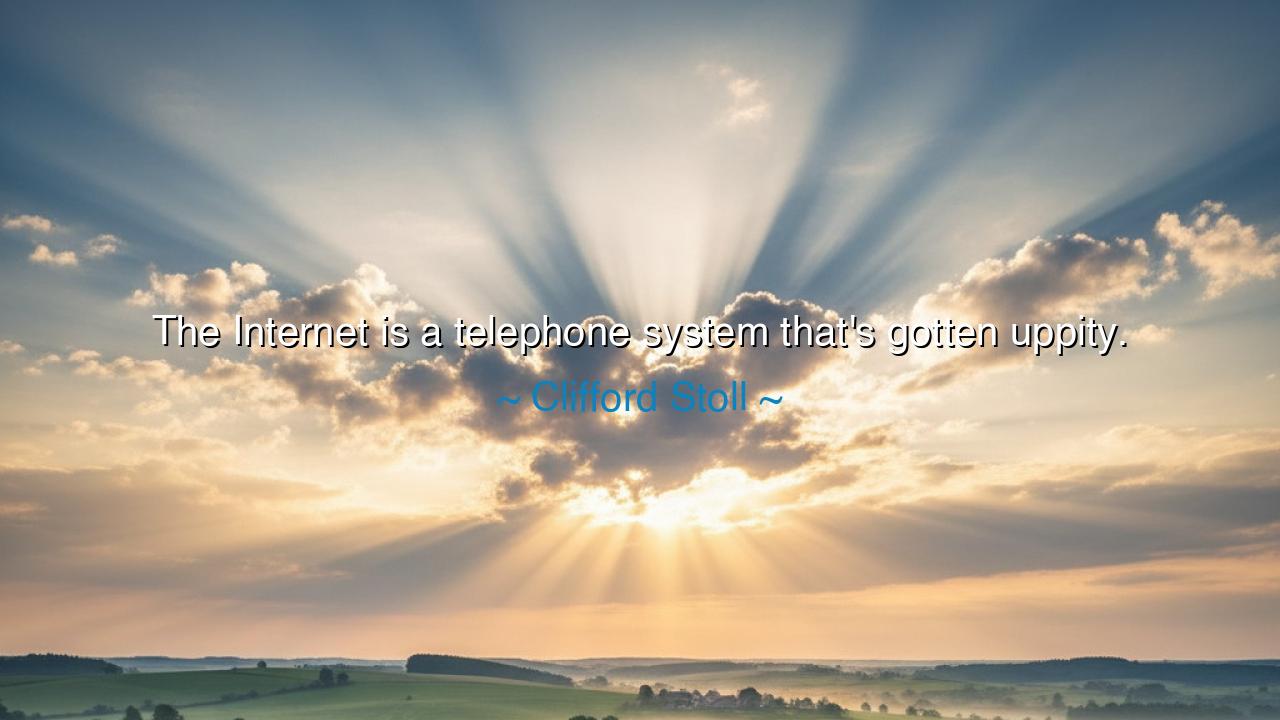
The Internet is a telephone system that's gotten uppity.






Hear the sardonic yet prophetic words of Clifford Stoll: “The Internet is a telephone system that’s gotten uppity.” At first, this may sound like jest, a simple quip. Yet beneath its humor lies a truth that pierces deeply into the heart of technological evolution. For Stoll, who lived at the dawn of the digital age, saw that what began as a tool for simple communication—a means of carrying voices across wires—had transformed into something unruly, ambitious, and world-shaping.
The telephone system was once the pinnacle of connection. Voices crossed oceans through cables, bringing families together, conducting business, and binding nations more tightly than ever before. Yet it was still humble in scope, limited to sound, tethered to a line, structured by operators and switchboards. Then came the Internet, born from the same veins of communication, yet no longer satisfied with being a servant. It did not just carry words—it carried thought, image, commerce, and entire societies upon its back. This is why Stoll calls it “uppity”: for it transcended its station and rose to redefine the world.
History is full of such transformations. Consider the printing press, first built merely to copy texts more quickly than the scribe’s hand. Yet soon it reshaped religion, politics, and culture, bringing revolutions in its wake. Or think of the steam engine, made to pump water from mines, which soon powered ships, factories, and locomotives, changing the very face of civilization. So too with the Internet: what began as a simple extension of the telephone now governs finance, learning, entertainment, even the most intimate aspects of our daily lives. The servant has become a master.
But there is both marvel and danger here. The Internet connects us in ways the telephone never could: it brings knowledge to the poor, voice to the voiceless, and bridges across continents. Yet it also overwhelms, distorts, and deceives. Where once a telephone call connected two souls, the Internet now floods a single soul with a thousand voices, many of them false or hostile. Stoll’s humor hides a serious truth: when a tool becomes “uppity,” rising beyond its original design, it no longer merely serves us—it begins to shape us.
So, O listener, what lesson lies here for you? It is this: honor the tools of progress, but never forget their origins. Remember that the Internet is still, at its heart, a channel for human voices, no matter how many shapes it has taken. If you use it wisely, it will enrich you, as the telephone once enriched families and friends. But if you use it carelessly, it may drown you in noise, severing the very connections it was meant to strengthen.
Practical steps follow: choose your connections with intention. Do not let the flood of voices distract you from the ones that matter most. Use the Internet as a tool for learning, for truth, for genuine conversation, not as a substitute for real presence. Set boundaries for its use, lest it master you as an unruly servant turned tyrant. And when possible, do not forget the power of the simple call, the direct word spoken between souls, unclouded by the machinery of endless distraction.
Thus, remember Clifford Stoll’s wisdom: “The Internet is a telephone system that’s gotten uppity.” In this jest lies a warning and a hope. The tools of mankind will always grow beyond their beginnings, reaching for heights unimagined. But it is not enough to marvel at their ascent—we must guide them with wisdom, lest they cease to serve and begin to rule. Use them well, and you will not only master the machine, but preserve the humanity it was built to carry.






AAdministratorAdministrator
Welcome, honored guests. Please leave a comment, we will respond soon